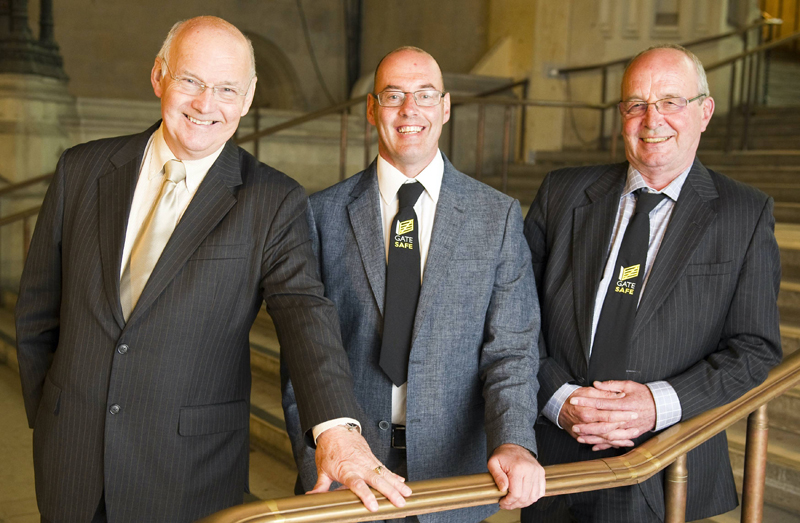
(L-R): John Lacey, former president of IOSH, Rob Williams, Technical and Training Advisor for Gate Safe and Richard Jackson, founder of Gate Safe
Charity Gate Safe commemorates its 10th anniversary this year as survey results show that business appears to be booming, (73% of respondents reported an increase in the automated gate aspect of their business) which means that there is an ever increasing requirement to ensure the safety of the high number of gates being installed and maintained.
Successes for the charity since inception include:
- The Gate Safe Summit on 23rd September 2010 represented the first dedicated automated gate safety initiative. It was the first time a broad range of professionals representing a number of different industry sectors and safety organisations had come together to address the need to improve standards in automated gate safety.
- With the Health & Safety Executive’s backing, Gate Safe rolled out the industry’s first specialist training course, approved by IOSH and designed for installers and anyone involved in the automated gate sector to deliver clear, practical guidance on how to ensure a safe and compliant automated gate / barrier.
- Gate Safe brought the issue of automated gate safety to Westminster, both via the petition to Downing Street in 2010 and subsequently via its Westminster Roundtable initiative (ongoing)
- Gate Safe was the first to raise awareness of the fact that manual gates, can pose as great a risk as automated gates and barriers
Site surveys undertaken by Gate Safe still frequently reveal safety issues with automated gates, which the charity attributes to either ignorance, historic failings which precede the campaigning for safer gates or simply poor attention to detail.
Gate Safe founder Richard Jackson said: “Sometimes we come across gates where the installer has clearly tried very hard to comply with best practice but failed to identify a key issue which could seriously compromise the overall safety of the installation. We are also aware that despite the work that has been done to promote the need for specialist training amongst professionals, the ‘accidental installer’ still exists i.e. someone who is on site for other works but is asked to divert their skills to dealing with an automated gate, without the required specialist training. Our message to these individuals is simple; say no and walk away from the job. This will always be the best course of action until such a time as the relevant training has been followed to equip the installer with the skills and expertise to ensure a safe and compliant gate. The hefty price that will be paid upon being held accountable for an unsafe gate – and potentially a loss of life – far outweighs any offer of extra income generated by taking on the additional work.”
While some of Gate Safe’s planned initiatives for 2020 have had to be shelved due to the pandemic, the charity remains optimistic about a range of future projects. Richard Jackson continues, “We remain resolute in our commitment to collaborating with influencers, professional trade associations, government bodies and the media to educate and raise awareness of the importance of following the appropriate protocols to mitigate any of the risks which may be associated with automated gates and barriers. We are hopeful that as the country begins to return to normal working practices, we can initiate the rollout of further plans designed to achieve our end goal of making gates safe.”

